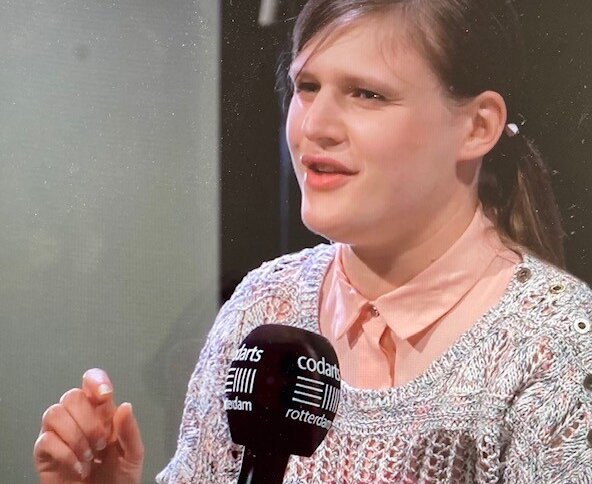At this year’s Codarts Research Festival she conducted the lecture ‘What the Ears Can See: Using musical parameters to observe cognitive functioning in stroke rehabilitants’. “The community at the master programme was something unique.”
Rita Kárpáti is a Hungarian-born musician, music educator, and music therapist, working in the Netherlands. She graduated in 2021 after completing her Master’s thesis on the music-based clinical observation of cognitive functioning in stroke patients. Currently, she is doing clinical work with clients suffering from acquired brain injuries and the Syndrome of Korsakoff, while also learning and writing about, and presenting topics related to memory, cognition, and the clinical use of music.
At this year’s Codarts Research Festival 2022, on 17 March, Rita conducted the lecture ‘What the Ears Can See: Using musical parameters to observe cognitive functioning in stroke rehabilitants’. Last September, she delivered a slightly longer version of the same presentation at the Open Research Day of the Master of Arts Therapies (MAT).
Rita: “That was practically a ‘recap’ of my master’s thesis process for the students of the current MAT cohort. Since it was a positive experience to everyone involved, the MAT faculty asked me to do another round at the Codarts Research Festival. I was really happy to say yes, as this was essentially my first presentation within a professionally organised, multidisciplinary conference setting; a marvellous practice for similar occasions in the future!”
Duality between observing and influencing
The topic Rita chose for her thesis and the following presentations touched upon how experienced music therapists use the medium of music to observe cognition in clients recovering from a stroke (or a CVA, the medically correct term).
Rita: “What made the study really interesting is that the data came from nine music therapists from three continents, whose only common feature was that they worked with a similar client group. During the analysis it turned out that these professionals had some well-defined music-based strategies for challenging and triggering cognitive functions in the clients, yet – oddly enough – they barely ever mentioned the music of their clients, and what it could reveal about cognitive health. So, I decided to delve into this duality between observing and influencing, and where music could potentially fit in between the two.”
Learning interventions and little tricks
Music Therapy is, just like many other clinical healthcare fields, meant to be learned in practice, Rita tells. “Before starting my studies four years ago, I had this naive idea of the school being about learning interventions and little tricks that one would directly translate back to real-life situations at the workplace. Now I know that the role of the school is more to provide you with the theoretical background and research skills needed for practicing your profession. And, to a much bigger extent, to prepare you psychologically by requiring you to constantly evolve and evaluate yourself. I only learned to appreciate this emotional aspect when I first saw the ‘frontline’ during my clinical internship.”
The community at the master programme, by the way, was something unique, Rita says. “And it still is, one full year after graduation. No other class I had previously attended went that far in terms of collaboration, mutual support, and trust. Something about the content and the structure of the study programme cultivated that, although it is still hard to put my finger on it.”
I am still so curious about the nature of music
As a music therapist, Rita is working at the Saffier Healthcare Group in The Hague, with two client groups: people with the Syndrome of Korsakov, and people with acquired brain injuries.
Rita: “I use this first work year to learn more about these conditions, how to care for highly vulnerable people, and how to handle my own mind while doing so. I do my best to attend conferences and workshops regularly, and I recently joined an intervision group too – with other former Codarts students!”
Aside from the clinical angle, Rita really would love to focus more on research in the future. “And get immersed in some seemingly narrow, little niche topic that nonetheless branches out into other disciplines, such as systematic musicology or neuroscience. I am still so curious about the nature of music and the humans making it!”
Does the alumna have a tip for the current master students? Rita: “This is a personal one: don’t be too scared to make mistakes at your clinical internship. The knowledge you acquire through your most embarrassing ‘blunders’ will be the ones that will stick with you the longest… Emotions are a powerful catalyst for your memory. Also: your supervisor is there for a very good reason.”


